| Web
and Book design,
Copyright, Kellscraft Studio 1999-2008 (Return to Web Text-ures) |
 (HOME)
|
|
CHANGING OWNERSHIP OF FARMS ON many of the roads out of Boston, especially south and southwest, one sometimes sees stately old dwellings with pigs running about the door, and every evidence of decline. This decline, however, relates merely to the farm buildings. The farm itself has been sold to immigrants who are thinking exclusively of the commercial side. They are keeping up the fertility of the acres or restoring them but they have no appreciation for the beautiful. We hear indignation expressed about this state of affairs but if the owners died, or living, had not the pride or energy to keep up their places someone must own them. Certainly unless a critic himself has redeemed some such country place his mouth is stopped. THE ELEAZER ARNOLD HOUSE This changing condition of ownership is so general, especially in eastern Massachusetts, that we would say the majority of the old families have left their places. Either they lie in the churchyard or have gone to town or to the West. There are districts where a generally shabby condition continues on long stretches of road. Where, as in the case of Millis, Dover and other towns, land values become high, there is likely to be a shifting back of many of these old places into the hands of Americans who are able to restore them to their pristine attractions. But it is wonderful how the immigrant will stick in some instances even when his land values become very high, and there are spots which are likely to be eyesores for a long time until his children or children's children shall catch the better American spirit of improvement. We are free to say that the native American had allowed the process of deterioration to begin, but he drew a line at pigs on the porch. 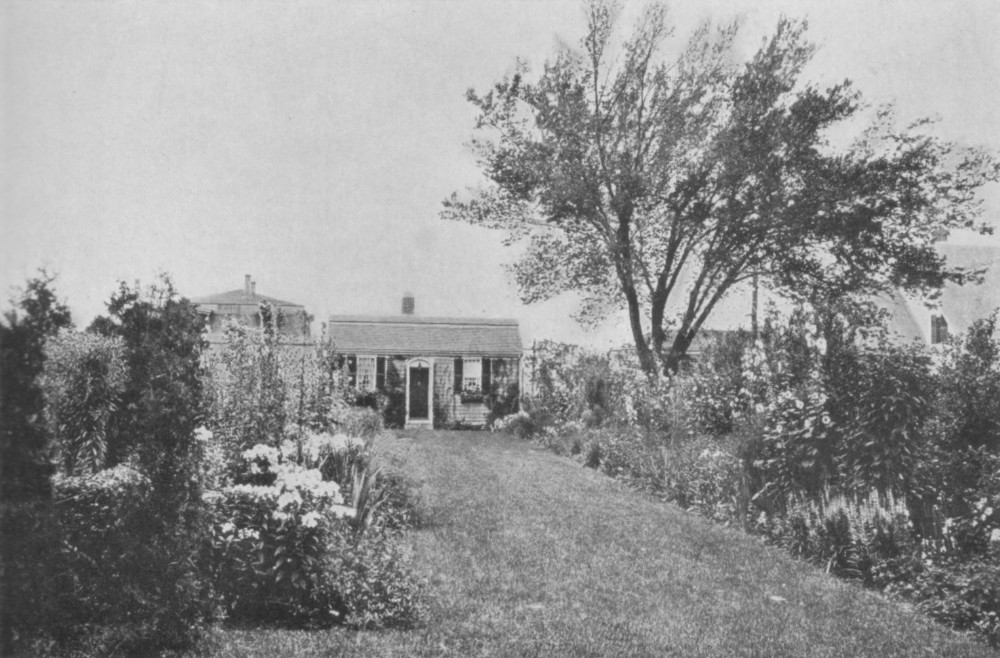 A PLYMOUTH GARDEN HOUSE 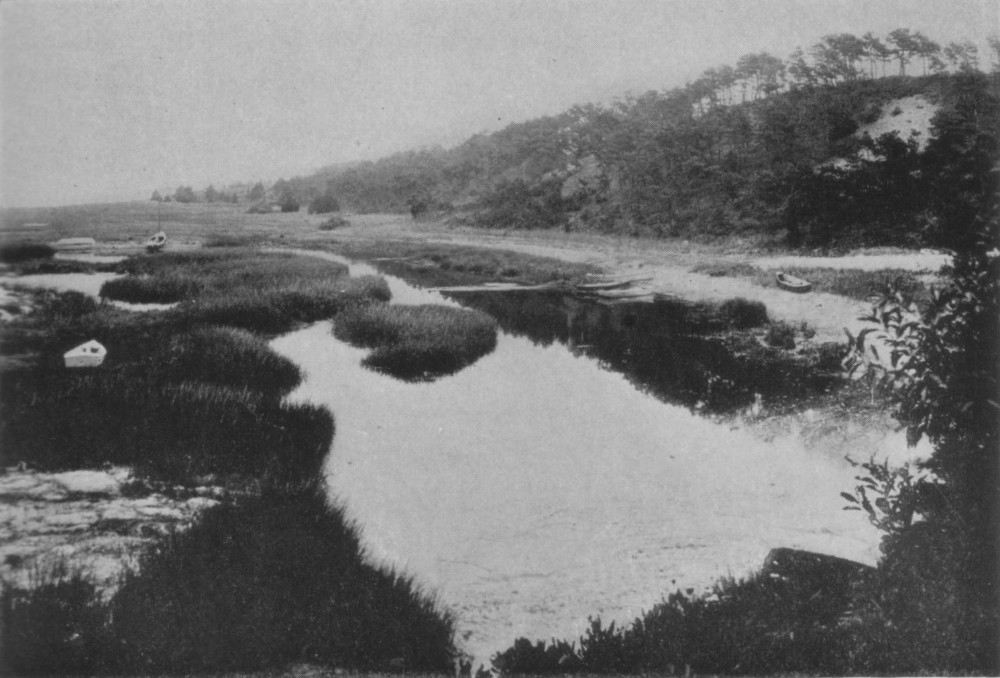 A CORNER OF PLEASANT BAY 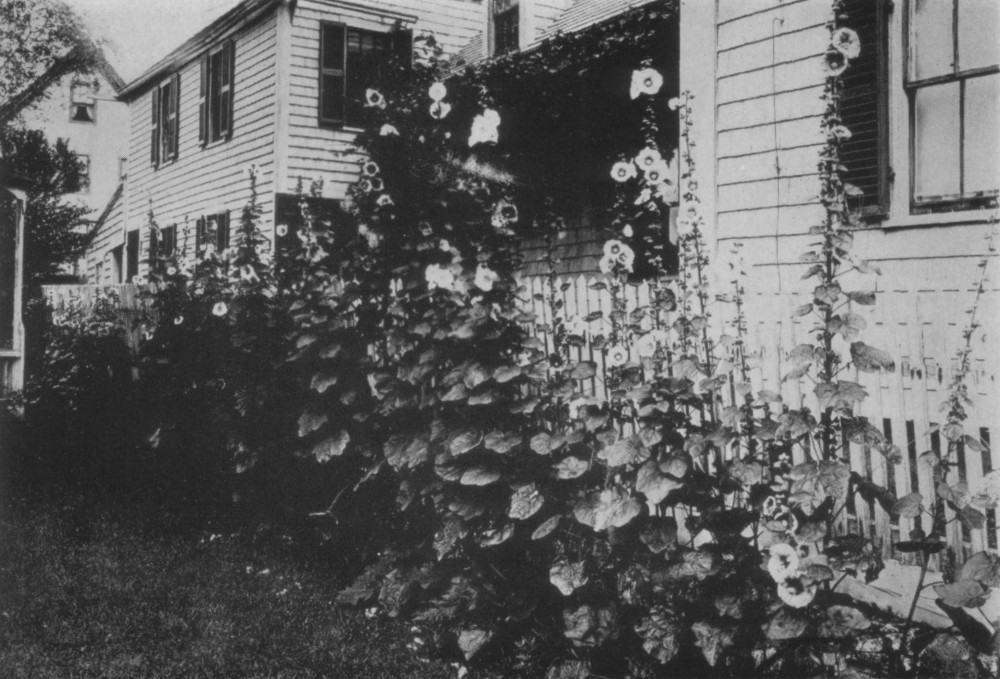 PROVINCETOWN HOLLYHOCKS  A DENNIS LILY POOL It will be feasible for a long time
for many who are totally blind to the esthetic to retain extensive acreage
because nearness to a great city will give high values to the land for market
gardening. We remember an instance where a malodorous garden of this sort
extended to the very windows of a wonderful old mansion. A young scion of the
family married and returned to the house and purchased back enough of the
family acres to free him of the offensive intrusion. So far as Italians are buying these
lands there is hope that their artistic strain may crop out and that they will
seek for beauty about their homesteads. But however much we may admire the
Italian art temperament, there is no nation consisting to any large extent of
artists. It would be invidious to mention some of the other nationalities that
have purchased old Massachusetts homesteads. One or two nationalities very
thrifty, but devoted to the compost heap and accustomed in the old world to
pile it near their front doors, may take long to get better ideas. The
conservatism of some foreign farmers is only equalled by some of our own. We remember instances where farms in
the center or western part of the state have been purchased by the Hebrews and
become centers around which gather innumerable decrepit automobiles or carts or
rubbish until we conclude that a cyclone must have swept through. The Hebrew
begins by cultivating the soil ostensibly, but he invariably ends by being a
cattle trader or a trader in something, and it is very seldom that one sees him
striking his hoe into the soil. Perhaps we ought to be glad that
anybody wants our country acres. We are in a state of flux at present and the
future of farms fifty years hence will be very different. The specializing
process will have proceeded farther and there will be more attention to
neatness and, indeed, to beauty on the part of those who are now just getting
their start. We may forget that an old farm is
bought under a heavy mortgage and that the buyers are busily engaged in
clearing off the mortgage. Some Americans would buy and borrow on a mortgage to
improve the buildings. The foreign buyer is wiser. He wishes to own his acres
and to proceed on a safer line. Meantime the state must suffer the
dilapidation incident to poverty or lack of taste. The influence of example,
however, is universal and an attractive farm place never exists long without
imitators. We have noticed many instances where a door head or a form of gable
was copied for miles around. This imitative spirit will come in good stead as
time goes on and the daughters of aliens become thoroughly American and will
desire homes as well kept as their neighbors. The writer has a great respect for
the diligence and capacity of most of the immigrant buyers of eastern farms.
They at least look the world frankly in the face and expect to get their living
out of the soil. In this they are succeeding far more often than the American
farmer of the old stock. We remember seeing a great many years ago a cartoon showing the forebears of the Knickerbocker families disembarking from a Dutch ship at Manhattan. Certainly as to cleanliness and education and property they had very little to recommend them. The glamour of tradition happily cast about our ancestors some attractive traits which they may not have possessed. At least they knew how to dig and they came here to dig and they are now well entrenched. We are very hopeful of improved countrysides in Massachusetts into whosesoever hands they may now have fallen. THE NASHUA RIVER THE Nashua River in its Massachusetts course passes through some of the most beautiful intervale towns anywhere to be found. Taking its rise in the hills of Worcester county and gathering to the great Clinton reservoir, it flows through Lancaster in a course of exquisite beauty amidst splendid trees. It meets at South Lancaster the North Nashua River and moves on into Harvard. A branch in that town called Still River, on a perfectly level plain, is full of fascination from its fine foliage banks.  THE BEST OF THE BIRCHES - LENOX-STOCKBRIDGE 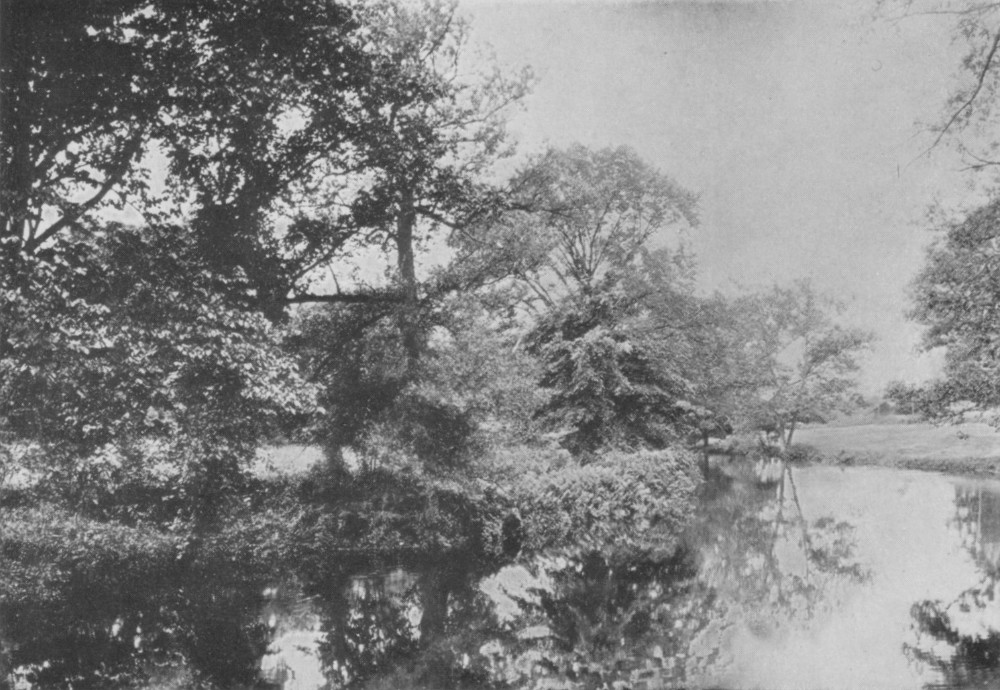 HOUSATONIC CURVES 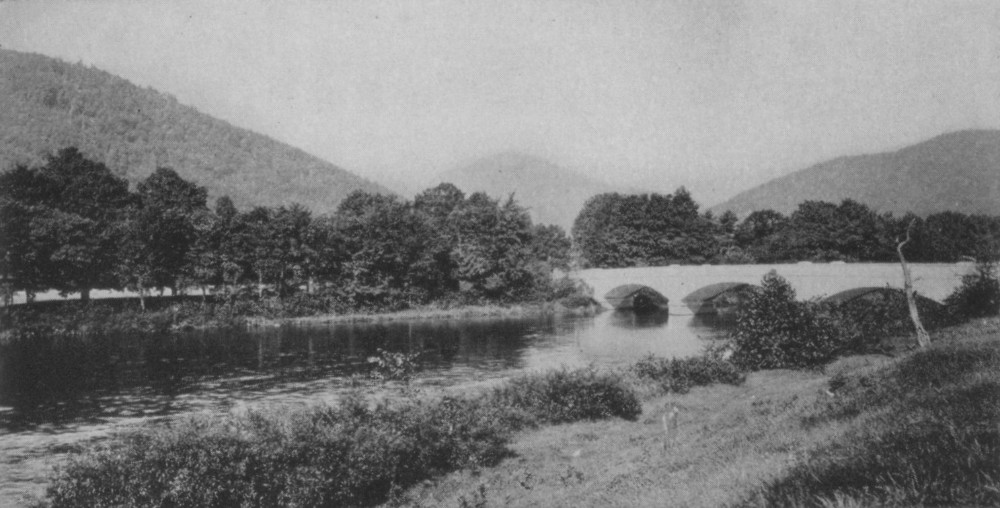 MOUNTING THE MOHAWK TRAIL At Shirley it meanders by the base
of fine hills and flowing, in the main, nearly north, passes through Groton
with many a curve of beauty. Then at Pepperell, although the river has passed
its youth, it has not lost its beauty. We lose it to New Hampshire among the
Nissitissit Hills. If one is looking for splendid trees and fine meadows, on a
stream, we would say he should seek no farther than the valley of the Nashua.
The soil in the bottom lands of this stream seems to be perfectly adapted for
great tree growths. The elm, in particular, seems to reach a climax of
superabundant life in this neighborhood, and our pictures of The Seven Bridge
Road and of The Nashua Asleep, and other scenes along the stream, record
certain of its aspects. If one were transported blindfold to Lancaster or Harvard he might almost mistake his surroundings for an old world country, since there is such a number of culture features, which have taken advantage of the waters. OTHER STREAMS THE western branch of the Westfield
River as one comes down from the heights of the Berkshires in Washington
between Middlefield and Becket to Chester, and meeting there with Walker Brook,
and going on through Chester to Westfield, by the Jacob's Ladder trail, shows a
great deal of variety in its course. In its upper waters it is a rapidly
rushing torrent, with here and there a lucid interval, by a mill dam or a small
meadow. By the time it reaches Westfield, however, it becomes more sedate,
mature with broadening and ripening charms. The Sudbury and the Assabet, meeting
to form the Concord, each has many alluring curves with finely draped foliage
banks. It is, however, the smaller streams feeding these rivers that provide the more cosey and hidden nooks and banks of beauty. A WEYMOUTH HOMESTEAD In the northwest of the state the Hoosic River, while marred by lines of railways, here and there escapes contamination, and wanders to a silent and secluded shrine, where it communes with the grasses and woodlands. It moves between noble hills which afford some of the most beautiful scenes in Massachusetts. THE OLD STAGE DRIVER THIS picturesque figure is lost to us, but in his day he was an institution not so reserved and haughty as his great-coated English cousin. The Yankee stage driver descended to common things and did not hold himself above the upper middle class! In the informal American life he could often descend to joke with his passengers. Asked what the fare was he might reply, "Wal, I charge homely girls seventy-five cents, but girls as good lookin' as you are ought not to pay over half a dollar."  A FERN PATH - PITTSFIELD  BELCHERTOWN MEADOWS 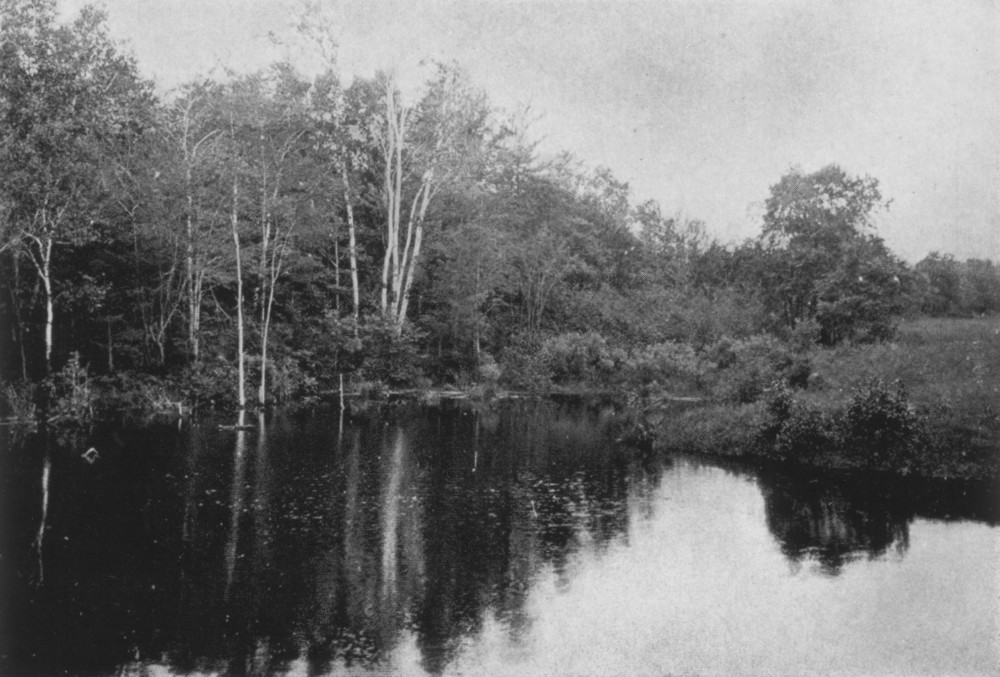 A LINKS POOL - NORTH ADAMS 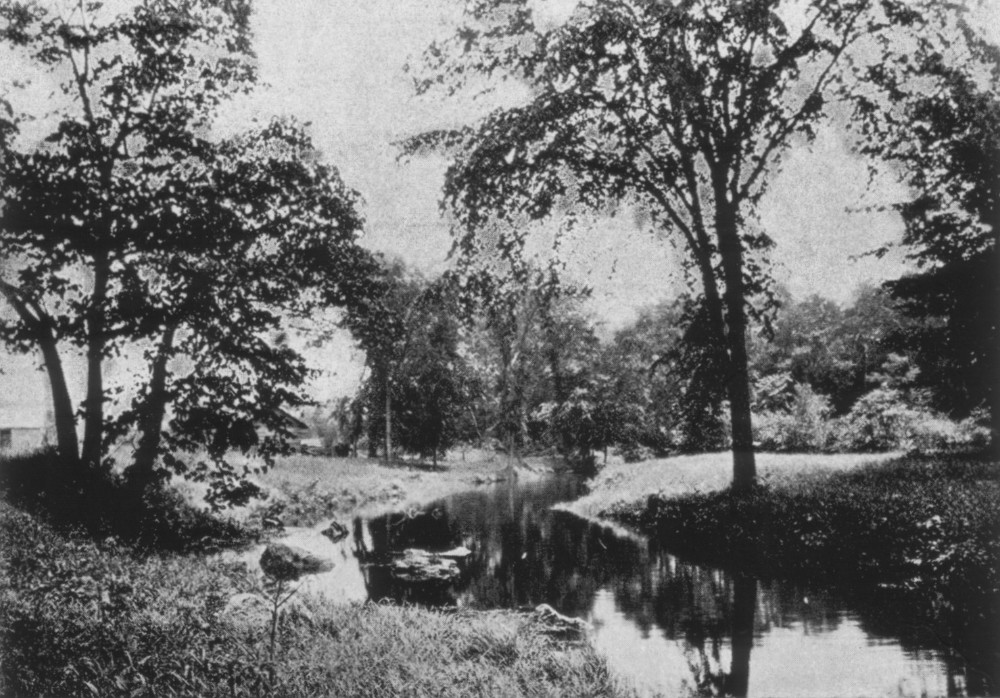 A BERKSHIRE MEADOW - PITTSFIELD He was a resourceful character, he
knew everybody, did errands for the housewives along the route, and was a
connecting link for the neighborhood. We will not say that he did not relish
imparting the news. In fact, he was somewhat of an artist in this matter, and
could, on occasion, throw in a touch of embellishment which gave a certain
finish and interest to his tale. As his vehicle was too jolty to permit
reading, he became the natural partner in conversations on the long road, and
while he would not often grudgingly admit the things he knew, he did not
hesitate to take for granted, to some degree, things that he did not know. He was an intense local patriot.
There was no country as good as this through which he drove, and no town equal
to that in which he was at present. To be sure the roads could be better, but
he believed in fighting it out on that line. He grew old in his service, and
his whimsies came to be understood by dwellers on his route. Happily, however,
there were enough strangers, especially in the summer, to laugh afresh at his
old saws and modern instances. In fact, if a summer guest came to abide in the
hill town, it was necessary to run the gauntlet of the stage driver's
questions. He sought indirectly, and then if his quest did not bring the
desired information, by the most direct methods, the origin, age, family
connections, profession, financial standing and any other unconsidered trifles
relating to the traveler. It was a kind of moral obligation, an eleventh
commandment so to speak, which touched his professional pride, to say that he
was "posted" as to the new comer at Taylor's boarding house. We began to make pictures while he
was still on his route. He eyed with much curiosity the square boxes connected
with the picture processes. The tripod might have been a surveyor's.
"Makin' pictures? What do you do with them? Would anybody want a picture
of that brook? Well, the fools ain't all dead yet. How long are you goin' to
stay? How much can you git for them? Yer don't say! What will you charge to
make a picture of my pair?" It was then our turn. "Do you
think your pair are an art subject?" "Wal, I don't know about that,
but they have hauled a great many big men, some of them bigger than you be, I
reckon." Another driver was a good deal bothered to make us out. Finally he was in such obvious distress that we volunteered the information that we got our living largely out of apple trees. "Oh," said he, "You are in the nursery business." "No." He looked a little thrown off but came back with the reply, "Oh yes, I see, you buy apples." "No." "Look here, you ain't one of them men that buy up old orchards to make tool handles, are ye?" "No." The poor fellow was at the end of his invention and relapsed into a distressed silence. It was too bad to keep him in suspense further, so we informed him that our business in the apple trees had to do with the blossoms. This completely passed the realm of his experience, and it took him all summer to get over it. Pictures of blossoms! Wal, they are kind of pretty now you come to think of it. Where do the pictures go? Often to the South and West where people think they are peach blooms, but some people never believe it when we tell them they are apple blossoms. They say no apple tree ever grew as large as that. "Huh! You tell them Colorado fellows to come up here to the old Orcutt place, and I will show 'em apple tree trunks three foot through." AUNT MARY'S WE are off for a little country
village in an intervale between the higher hills. We must be there
professionally for some months and are recommended to Aunt Mary's. As the
deacon said in the prayer meeting, we have passed through seens and unseens, in
the way of boarding houses, and we received with some skepticism the
recommendations about Aunt Mary's. We are met by a little woman in black. She is made even smaller by stooped shoulders. Her eyes, however, are full of sparkling intelligence and kindliness. She shows us to a great square chamber as neat as the most fastidious could wish. It is, in fact, as neat as a dear old maid can make it. There are four windows, there is a quaint old fireplace, there are old steel engravings and old time prints. The paper is covered with little posies, and the furniture, happily, was made before the worst period when men, seeking after originality, produced the most ugly shapes imaginable. 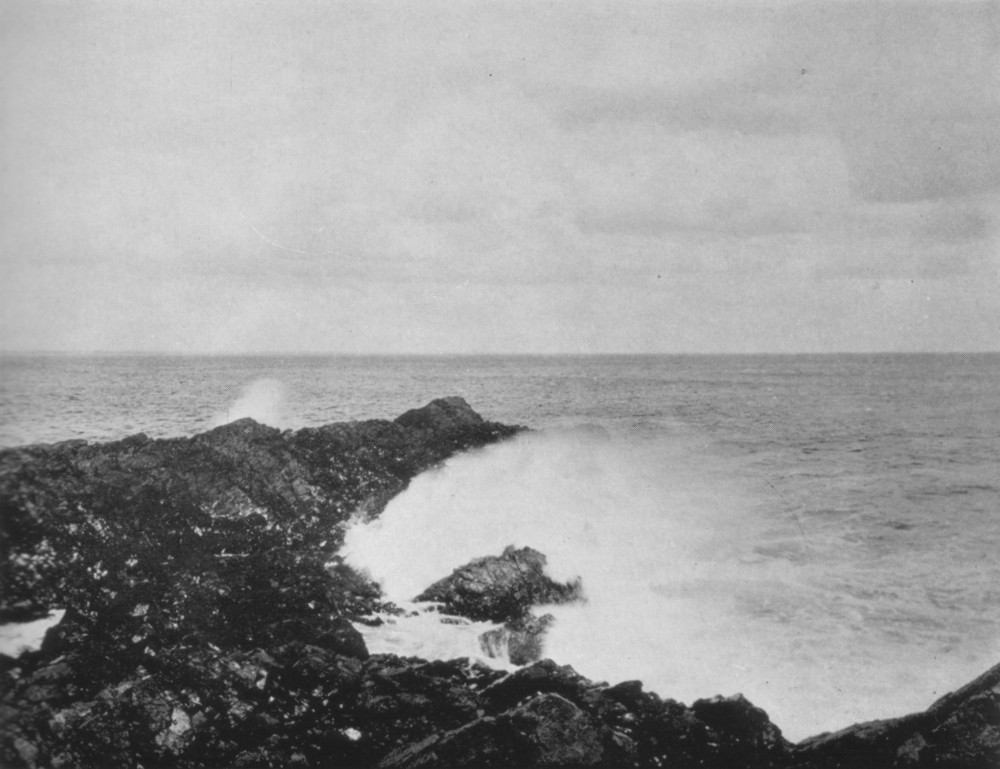 BLACK AND WHITE - SWAMPSCOTT 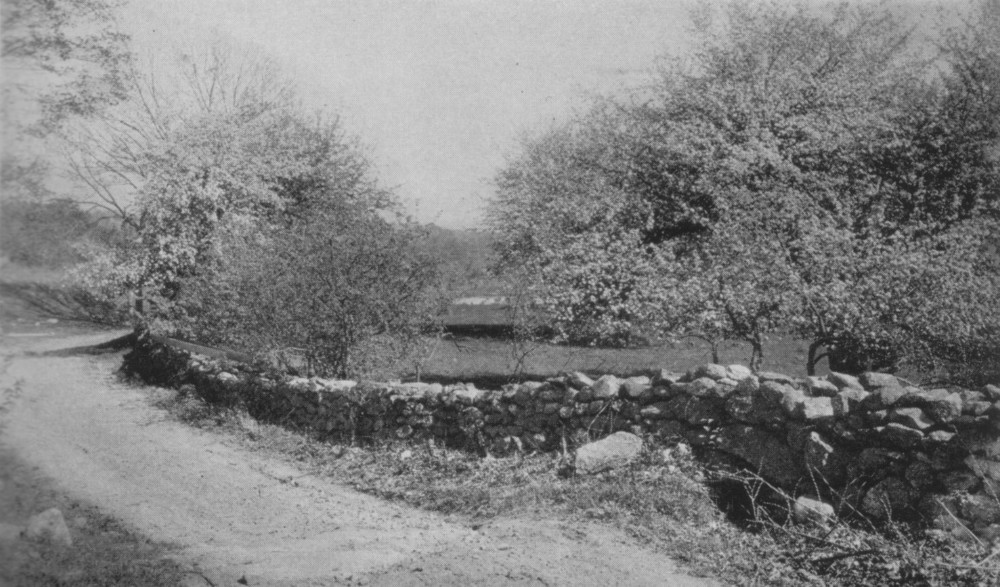 DOWN THE ORCHARD ROAD - NEAR MONSON  BIRCH WRAITHS - NORTHFIELD 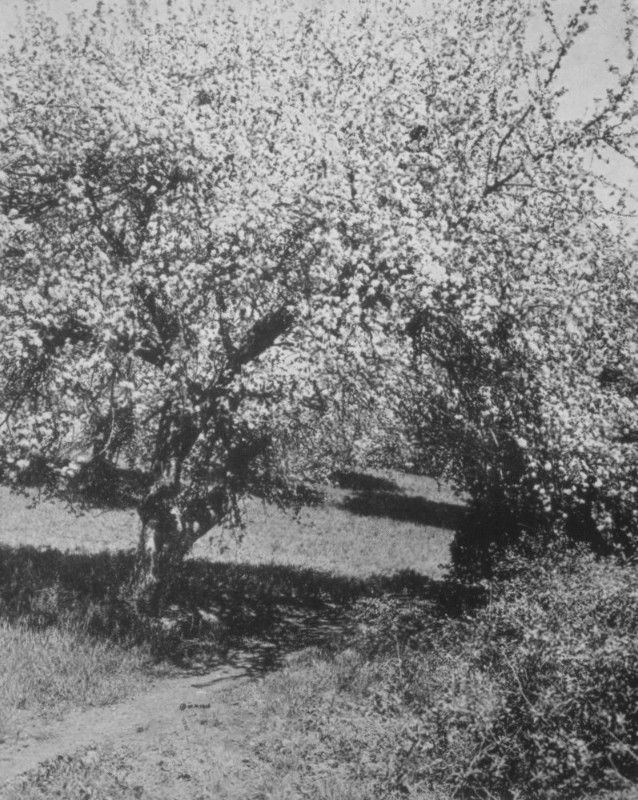 BLOSSOM ARCH - LITTLETON Left to ourselves we sit by a window
on the side of the house and peer out into the garden and the orchard, an
advance guard of which stands sociably near. Ah, yes, he reaches out an arm
with a large cluster of August fruit, taking on fine colors in the splashes of
sunlight that shoot through the waving bough. We advance a hand to meet this
friendly overture and can actually touch the ripening fruit. We find out later
from Aunt Mary that if we are here a month it will be ripe for us to pluck, and
that is the special perquisite of the occupants of that room. There is another
branch above us arching the window, and when the breeze takes the bough a
gentle and friendly brushing against the clapboards occurs. We are the first of Aunt Mary's
boarders for the season. She has a fine spirited girl who goes to school at the
academy, and helps Aunt Mary at table. How delectable was that picked-up chicken!
Did ever a dish of apple dowdy go to the spot like that? And the blueberry
muffins are beyond praise. We dream of them yet. As boarders come, now one, now another, from the great city we find them all a picked company, who are there because they love Aunt Mary and her ways and works. It appears later that she was induced to part with her little old wood stove and get a modern range, but in a few days out it went and back came the companion of her youth whose ways she knew. Of course, a company like this must go rowing on the river one day, and down to the pond another day. Two or three young men make up a party to climb the heights and remain over night. A maiden of rather mature charms, or at least what she would have thought to be charms, has from year to year set her cap for the new bachelor boarders but so far in vain. Hope, however, springs eternal in the human breast. She can hardly understand how any one should prefer to tramp along the brooks after trout, rather than read with her in the afternoons from the romances of Wilkie Collins. Aunt Mary assumes a motherly direction over all her charges. They are not merely boarders. They are her own family, and she privately warns them of the snares set. The two high school girls are her special anxiety lest any cynical city youth should make an impression upon them. The two school teachers, however, who have imbibed modern notions, Aunt Mary feels are old enough to take care of themselves, and her sympathies are on the side of the bachelors in that case. 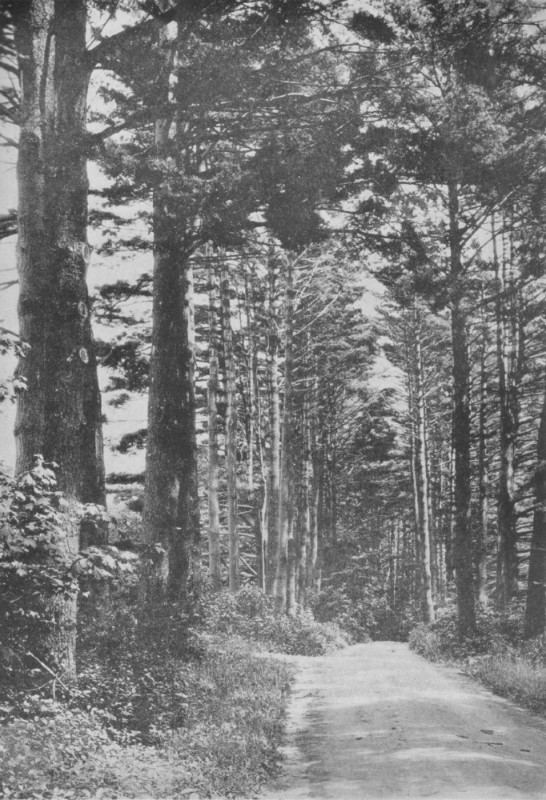 THE TALL PINES OF LENOX  WHITE STUDDED CURVES - LENOX 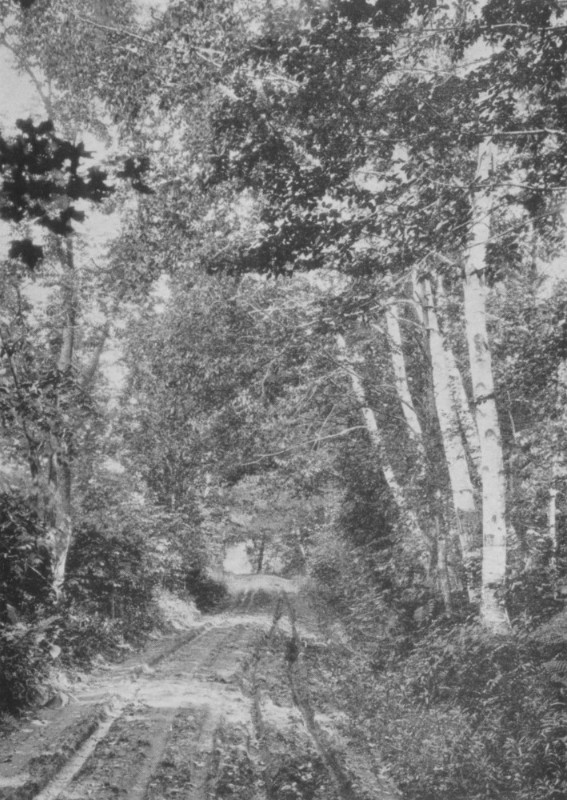 WHITE CLUSTERS - LENOX It is an interesting little world. A
good boarding house is the next thing to a home. Sweet airs blow through. If
ever an odor is noticed from the kitchen it is of that delectable sort just
sufficient to whet our appetites for the coming feast. The old parlor with its hair cloth
sofa, is the room where culprits or suspects meet Aunt Mary; also, if they need
a confidant, they may depend upon her. Sitting with her on the sofa we are
aware of her tender concern, her unshaken righteousness and her wisdom. It is
safe to tell Aunt Mary what is in your mind. Not only so, but it is not safe to
do anything else. From many a danger she frees us, and causes us to walk in the
way of the just — if she can. Aunt Mary could live the year
around, outside of the summer time, a welcome guest in town, with the various
persons whom she has cared for at her old homestead. No one ever forgets her
nor does she forget any. All who ever enter her doors become her
correspondents, and it is not well for them if they allow too long an interval
to elapse without suggestions from her wisdom. She is getting very old now and a
little more stooped. Her fine black hair one no longer finds, but a cap covers
the few stray gray locks. Blessed be the day that we found Aunt Mary's. Like
the Being whom she worships, she is good to all and her tender mercies are over
all her works. For so little a woman what a heart she has! The sorrows and joys
of multitudes are shared there. The secret griefs, woes and even sins of many
are there buried. She is a second mother to many a man now himself getting
gray. She is better than her dear old home and its orchard; better than her
fair village. She is really the heart of life. She inherits the best of
everything and is the fountain of good. We dread for ourselves but hope for her the word that she is no longer with us. She will give up her cares unwillingly or would do so, did she not feel sure that a kind Over-soul will give her other responsibilities. For Aunt Mary would be miserable without much to do and many to love. One begins by bargaining with her for board, and one ends by wishing he could give her more than money. That person is a cheat who doesn't share with Aunt Mary the best of his thoughts and the truest of his affections. ON THE CONCORD-ACTON ROAD BUYING AN OLD FARM
WE actually did buy an old farm and the experiences related below are a few of those that came to us. One is not long in possession of an old country place before suggestions begin to come in from the neighbors of what to do with it. A lady suggested that we take out the big old chimney and put in a smaller one, as it would give more room, and "lots of people were having their houses fixed that way." As we had purchased the house largely because it had a fine old stone chimney the advice came as a shock. The additional room was not needed. The house was of two stories, and had a quaint entry with the stairs running up on the front face of the chimney. It is not a modern stair, indeed, but we are convinced from large experience that the way to ruin any house is to try to make it a different style than it was intended. A house should be restored according to its period, or let severely alone. 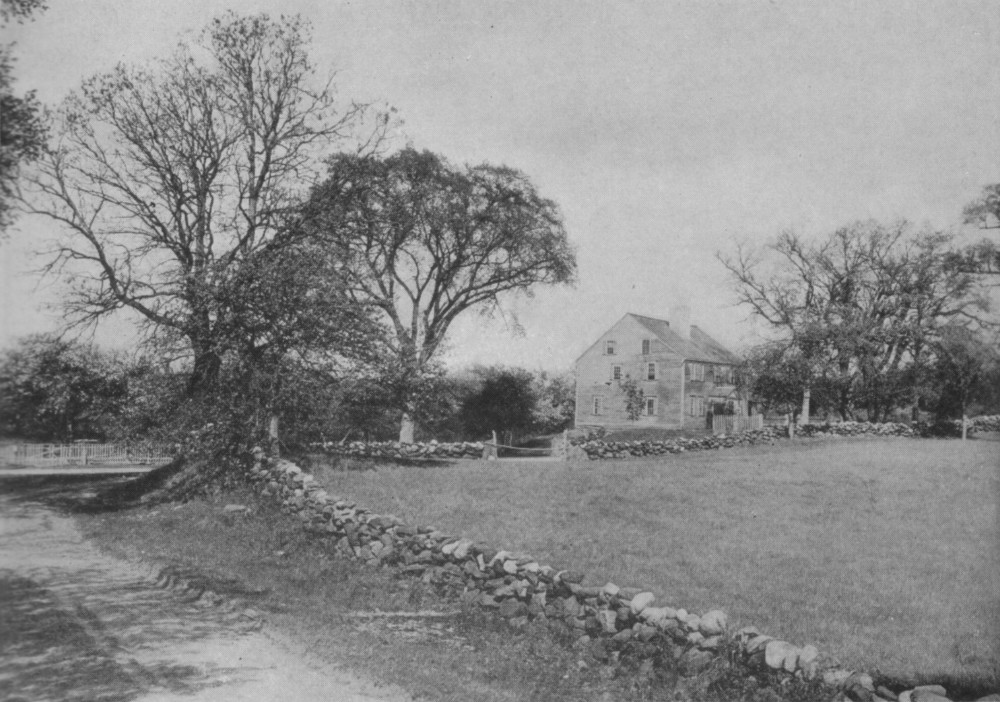 AS IT WAS IN 1700 - BILLERICA  ONOTA LAKE - PITTSFIELD 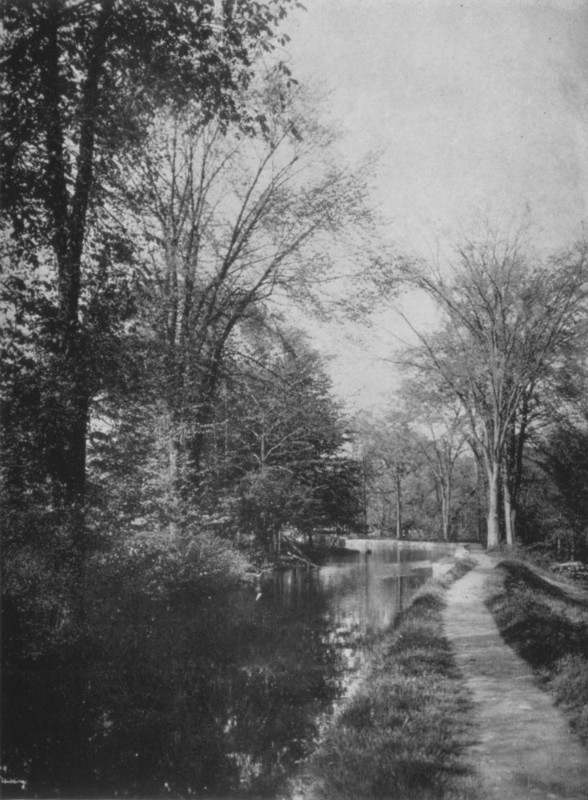 A BERKSHIRE FLUME 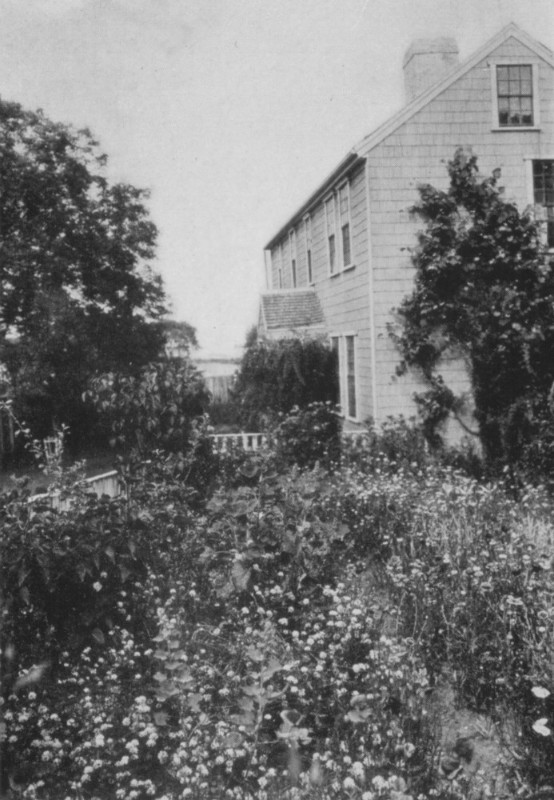 A PEMBROKE GARDEN All that had saved this old chimney
in the past, when an L was built, was the insistence of the aged mother that
the chimney be left as an "anchor." So far as we can learn the
thought was that a huge old chimney prevented the possibility of wreckage by
wind storm. We see many a solid ancient chimney standing after the dwelling of
which it formed the core has gone. On our first Sunday at church we
found a preacher whose weekday business was the sale of spectacles. It was
appropriate enough. He tried to get the people to see clearly the truth of the
spirit on Sundays. He was paid five dollars and drove into town and out again. A
cobweb was suspended from the preacher's desk and a window was full of hornets.
There was a suggestion of the wiles of sin and the snares set for souls in the
cobweb, and the hornets might have answered as an illustration, but the sermon
had been prepared beforehand, — a long time! We were asked if we sang, and were
handed the hymn book opened at the Doxology. The elderly dame who did this
courtesy was informed that we had been officers in a church. "Oh,
well," said she, "I suppose you know the Doxology. I do." On investigating a church fund for
the support of preaching it appears that an endowment had been furnishing the
five dollars a week aforesaid, on condition that four sermons a year be
preached on Foreordination. No collection was taken. Probably the endowment has
demoralized the entire neighborhood. A people who do not carry their own church
have no religion worth speaking about. In trying to bring the old house
back to its original condition we tear down a useless partition. We have been
saying that it is a pre-Revolutionary house. As the debris between the plaster
drops, out comes a beautiful skeleton. "Ah," says the housewife,
"a pre-Revolutionary rat!" The old tall clock looks well but is
somewhat uncertain in its movements. Happily we hit upon a way of setting it
without asking any questions. After inquiring the time for some days, we find
that the carpenter sneezes regularly at 1:20 P.M. We throw this out as a
suggestion. Perhaps it may not be as reliable as the Washington Observatory,
but we never know it to fail. The previous owner had a highly
decorated stove instead of a fireplace. He was in the habit of placing his feet
on the fender, wrapping himself in a bed quilt and, seated in a Boston rocker,
spending the night there. He said it saved the trouble of undressing and
dressing. We are learning fast. The night that the cows we had
purchased come home finds us in a dilemma. We have cows but no milk pail. We
are obliged to milk in a tin dipper. It takes one member of the party to hold
the dipper and another to do the milking. We hear of another city farmer who
had a like experience, and also forgot his milk pans. The question of country help
enlivens but does not always delight us. Our maid of all work we find one day
has been short of a belt, and has discovered in the waste basket an old
typewriter ribbon wherewith she has girded herself. The color on the shirt
waist is quite effective. Our first churning is enlivening. We stir the cream. The cream is too cold and we bring it to the stove. The husband, the wife, the niece and a hired man assist by turns. But these come in the form of relays or advisers. At first one person is supposed to be enough. We discover at last that the cream is now too warm, and it is removed to sulk for a day in the distant pantry. Four churners, four hours. When the battle is over the entire pantry is streaked with spatters of cream but the butter has come. Our niece has pearls of cream beautifully distributed in her hair.  LAKE CHAUGGOGGAGOGMANCHAUGGAGOGCHABUNAGUNGAMAUG 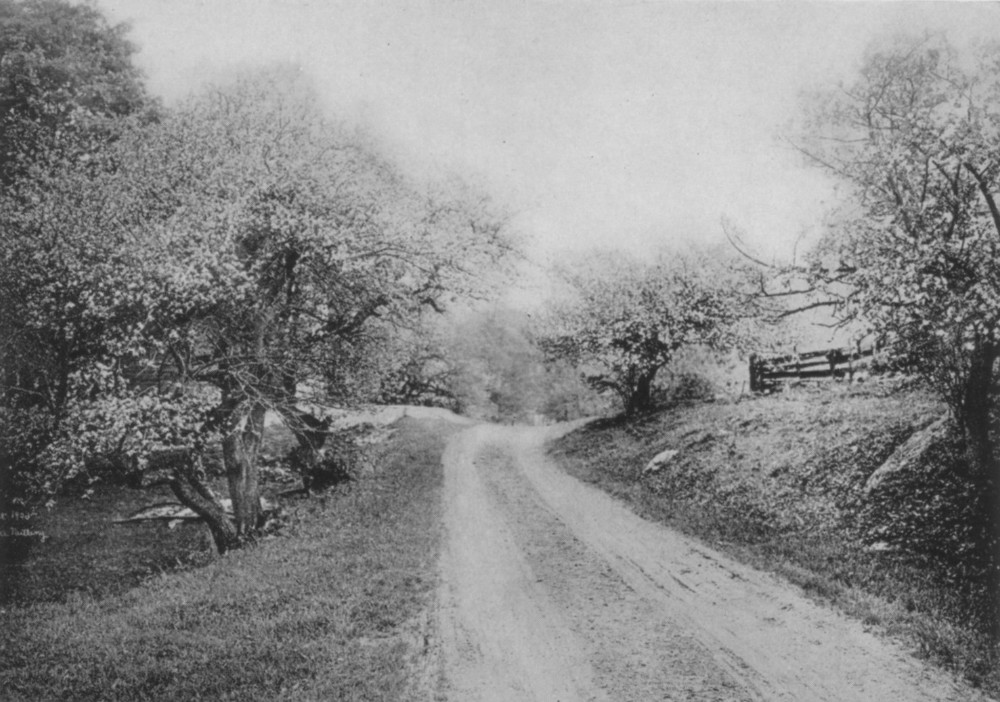 HAPPY VALLEY ROAD - BUCKLAND  TRAILSIDE BLOOMS - ERVING There is a cat that comes with the
farm. She is somewhat of an institution, and is commended affectionately to our
care. Her upkeep is less than that of an ordinary cat because she lacks a tail.
In process of time there is an addition to the family and after a few months we
smile to find ourselves sitting about the fireplace one evening with a cat or a
kitten on the lap of every member of the family. A truly domestic scene. When the old house is restored to
its original condition so far as we can do so, it is time to consider the
grounds. A fine clump of locusts borders one corner of the lot; several pines
at another angle shield us from the down valley winds. Then comes a row of
maples and outside the lot, bordering the street, a row of elms. There is a
definite slope in all directions to the brook, which is rather bushy and
inclined to be swampy, but it is so far below the house that we find it
feasible to throw a dam across a narrow glen, and provide ourselves with a
mere. Please note this word. No man going into the country and building a dam
forms a pond thereby. It is always a mere or a lake or lakelet or a pool or
something of that kind. And also, a city man should not refer to his farm but
to his country estate. Has it not gate posts? Is there not a drive nearly a
hundred feet long? And has it not a name? From time immemorial the district
has been called Poverty. Perhaps the name is prophetic. We try out several
names. One is Leaky Gables. Its fits but is a trifle personal. A friend of ours
suggests the name Weedy-lawn. If we spend as much energy in devising the
rotation of crops as we do in the naming of that place the exchequer will
balance better. The neighbors call it Robert's Folly. Rambling Roofs might have
done, but, if you love alliteration, Mossy Mound or Locust Lodge would not be so
bad. The exterior of our house we find to
be merely clapboarded on the studding and not boarded at all, an ancient
fashion in some parts of the country. For increased warmth and economy we place
tar paper outside the clapboards and run laths up and down to hold the paper in
place and put another set of clapboards on outside the laths. We secure, thus,
a very warm house and the effect is good because the window sash projects
sufficiently to permit this treatment. Of course we are sorry to lose the effect
of the wide projection. We point up the old stone chimney,
with its cornice. We use white paint on the house. Red would have been better,
though a red painted house is warmer in summer. We repair the old wall, that
borders the road, and is very effective. An old open shed is closed in and
becomes a hen house, and the square formed by this, with a tool and cart shed,
and a barn, is put in decent order and painted red. The farm land is much of a puzzle.
There is plenty of wood in the decayed trees by the roadsides and in the old
orchards. We set out a considerable orchard. In the spring many of the trees
have been banded by mice and others have disappeared. The orchard is over the
hill where we can not see what is happening, but it is obvious that others also
wish to go into orcharding. The slopes, here and there, of the
pasture, are decorated with fine spindling cedars like those one sees in Italy.
We are so unwise as to remove a portion of these, with the idea of clearing up
the pastures. We lose more than we gain. Cabbages appeal very strongly to the
new farmer. It is easy to see that at three cents a pound, one hundred thousand
will bring in a sufficient income. We go in for cabbages. In the autumn we sell
them for fifty cents a barrel, we paying for the barrels and the freight and
the gathering. The total loss is not more than a couple of thousand dollars.
Nevertheless, the lesson is well learned, and it is that the farmer should
never confine himself to a single crop, or indeed to two. In the long run, if
he has a variety of crops, one will bring a good price if another sells low. We
are helped out a little by potatoes, which are fine, large and productive, and
bring a round figure. The woodlot supplies fence posts for
sale and furnishes a fund large enough to pay the taxes. The garden is our delight. It is
highly successful. Our conclusion, after seven years, is that a farmer must be trained, and that he must himself work constantly in the field. He cannot gain anything on the wages of employees. They all cost more than they produce. At present the little, one man farm, is the only safe one, unless, in a very big way, one specializes on blooded stock of the highest strains, or secures, through years of effort and advertising, a special market. 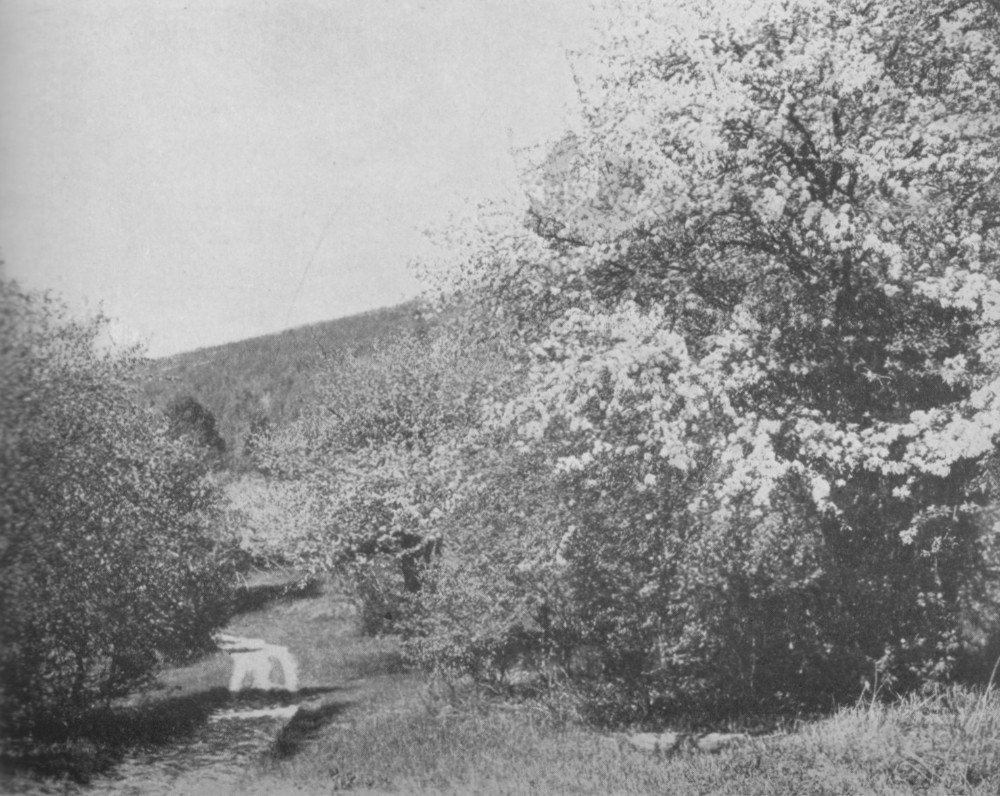 A NOOK BESIDE MOHAWK TRAIL  A MASSACHUSETTS ROAD IN MAY - ENFIELD  THE RIVER - NORTH ADAMS  PITTSFIELD WINDINGS But a farm for one who has been a
city dweller does much to take the conceit out of him, and to give him back
health. He sleeps well and inevitably becomes bucolic. The flings made at the farmer for
not reading more, fail to take account of the circumstances. At the end of a
long day he is inevitably drowsy. He must rise early. His evenings are short,
but at that he is as well read as the average mechanic, perhaps. At least we make our premises
alluring to the eye and, when the object of the country sojourn is achieved, it
is easy to dispose of our holdings. We have a dear memory; but it is
heartbreaking to leave such a heavenly environment. The waters are soft and
beautiful at twilight. The tree toads answer one another, and the evening
songsters call from the grove. The bleat of the lamb and the deeper toned
answer of the mother is borne to us. The great vase elms are outlined against
the evening sky in a vague and protective canopy. The evening star begins to
twinkle over the tall pine. A sweet, almost sacred, stillness falls. We are enfolded in the kindly curtain of the night. The embers glow in the waning light and the dancing shadows liven all the great room with odd figures. Bobby, the kitten, goes to sleep curled up in a big cap that we have dropped in a chair. We need little and we have much. Is there not a book shelf, even a repetition of them, each five feet long? Is there not good cream rising in the pantry? There will be blackberries enough to go with it for breakfast. The garden has some good things for us, and today's eggs are in the old wooden tray. The wood pile is ample and the old apple logs give us abundant heat. We do not lock the doors. It is time to put out the cat, wind the tall clock, cover the embers and go up the old winding stairs to the square chamber. COOPER-AUSTIN HOUSE - CAMBRIDGE A look before retiring discloses from our windows a world of sweetness and beauty. There can be nothing better anywhere. Love, health, comfort, beauty, warmth and sleep! The lore of the past to divert our leisure, the joy of battling the winter's storm, the joy of gathering autumn fruit, the joys of the fold and the fireside are all ours. All that we want and more than we need are ours. There are enough good neighbors to keep up our faith in the inherent nobility of human nature. They are kind to one another in times of trouble. Their innocent gossip is diverting. Within a few miles by charming drives we may reach centers of human activity. Whoever wants more than these things should keep away from the country, for his soul must be dull to its beauty and its joy.  TAIL RACE AND BRIDGE - SUDBURY  NEWBURYPORT TURNPIKE 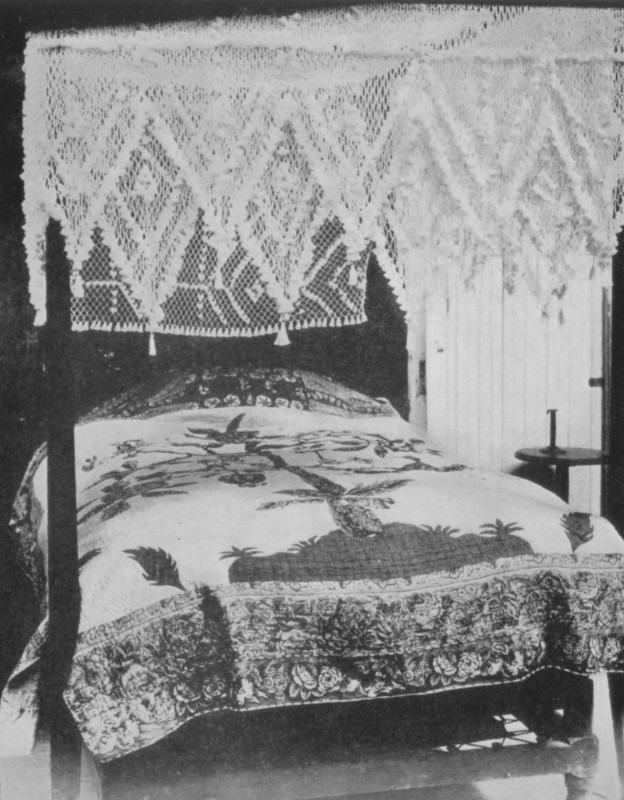 A TREE OF LIFE BEDSPREAD 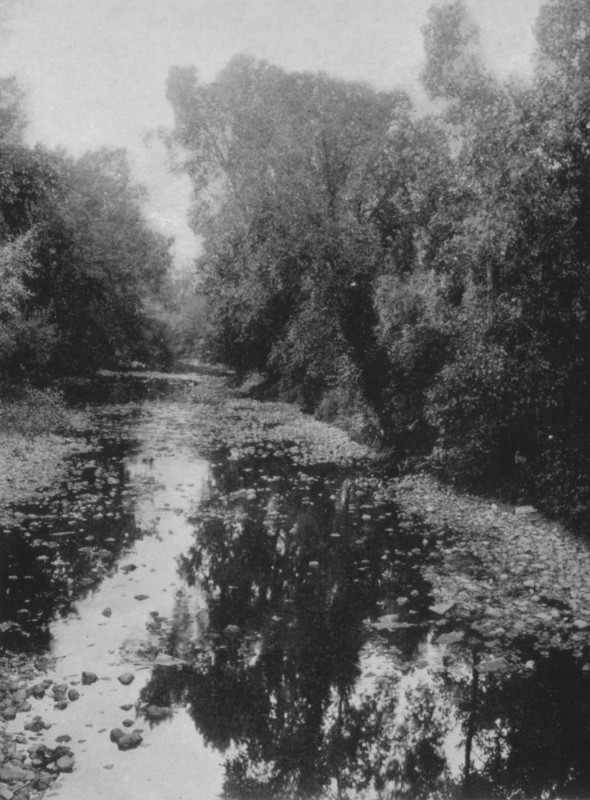 WILLIAMSTOWN WATERWAY
HOW TO SELECT A FARM PLACE
1st. Do not despise small buildings.
It is easy to spend and sometimes one begins too large. A little cottage
doubled is far more artistic than a big square house. 2nd. Avoid clay soil for your
residence. It is damp most of the year and the cellar is always so. Seek clay
soils for at least a portion of your land. Clay is the foundation of
agriculture. Soils are divided into clay, clay loam (three-quarters clay,
one-quarter sand), loam (half and half), sandy loam (three-quarters sand,
one-quarter clay), and sand. Sand is valueless, sandy loam requires much
feeding, but is quick and good for a garden. Loam is good crop land. Clay loam
is good crop and farm land, but clay is very stiff and hard to handle, though
perfect for grass sod that is not often to be turned over, and is the strongest
soil in the world. 3rd. Avoid rocky fields. It never
pays to clear stones. It takes generations and then they are not cleared. Such
fields may be turned into pastures if there is a moderate amount left of easily
arable soil. Occasional small stones do no harm, but ledgy fields or fields
with numerous small stones are vexing and profitless. 4th. In ledgy or stony ground an
orchard may be set, as such soil is often well fitted for fruit and sheep.
Sheep may be turned to graze in this pasture if the trees are protected by
wires. The orchard should be in sight of the house on account of the sheep as
well as the fruit. 5th. Find a country place with
possible spring sources to feed the house, by gravity. This is highly
desirable, as constant pumping even by machinery is a perpetual nuisance and
expense. 6th. Seek first for a farm off the
road, approached by its own little side road. Such places are not liked by
native country people, and are sold low, whereas the best taste marks such
places as altogether more valuable. If an estate effect, seclusion and removal
from possible unpleasant bounds, is sought, such a place is worth at least
twice as much as one on the main road. 7th. Avoid buildings where the barns
are so placed as to interfere with the outlook. If barns or out buildings are
very numerous it is far better to remove the poorer ones. There are almost
always too many and the upkeep of many buildings is very expensive. 8th. The intimate view is more
important than the distant view. If there are good trees, gentle slopes, or a
near-by brook, these are the things with which one lives. The distant view is
to be desired but is not at all of the first importance, and if an elevation
means wind and bareness it is better avoided. The ideal location is a high
slope, not too steep, and one that is sufficiently wooded. 9th. Bury your telephone wires or
bring them in from the rear. It is almost better not to live in the country if
there are to be poles on your road. If electric lighting is not supplied there
are modern systems now of great efficiency, and some degree of economy, that
are quite satisfactory. 10th. A tractor capable of cutting
the old wood around the farm, as well as ploughing and hauling, is now of the
first importance, and will save its cost several times over in a short time. 11th. Do not go into any kind of
farming that leaves you stranded in the case of failure of help. A farmer can
himself feed a number of sheep and young stock, but if he has more than one or
two cows his labors become onerous in case farm hands desert him. That is to
say, no milk farm should be undertaken, except the farmer is absolutely sure of
his men, through long knowledge of them, and an agreement covering a term of
years. 12th. Make all arrangements so that you will be as independent as possible of outside connections of men, animals, machines or power.  A CONCORD WAYSIDE  THE VALLEY OF NORTH ADAMS  A RICHMOND ELM SYMPHONY 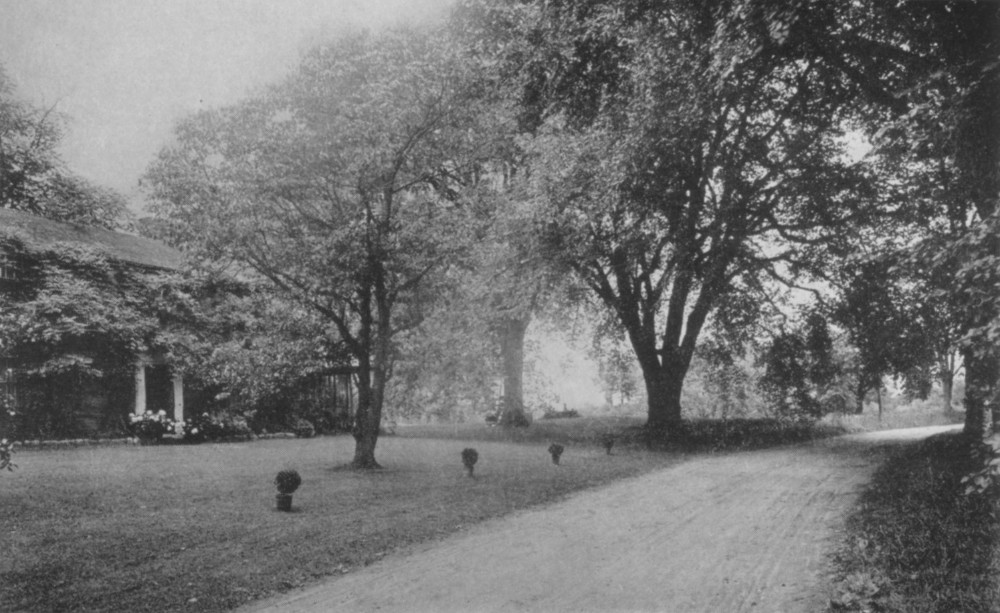 THE CONNECTICUT TRAIL - WAYLAND 13th. Farm lands should contain
fields, pastures and wood land, whatever else they may lack. Good orchards can
seldom be bought. The pasture is important because it affords the most natural,
most economical and least troublous method of summer feeding. Many old fields
ought never to have been taken out of the pasture. A wood lot is important for
the sense of independence it gives, for its esthetic advantage, and also and
perhaps principally as an investment. Almost any good wood lot, if properly
bought, will "clear up" more than it cost. We know of several instances
where wood has been sold, so that the farm place then stood the buyer less than
nothing. The wood develops quietly over in the remote corner of the farm and
its progress is often unnoticed. The joy of having a supply of old knotty
pieces for the fireplace is great, and costs only the labor. 14th. Do not bother to drain swampy
lands unless the soil is imperatively required. Coarse grass has its uses, and
in a dry season it is often a resource. 15th. Small fruits carefully
attended are a pretty sure source of some profit. High bush berries should not
be neglected. 16th. Not more than one horse should
be kept on a farm and that number is often one too many. Horses are the most
expensive features of the farm. Land that cannot be ploughed by a tractor had
better not be ploughed. If a horse is to be kept it should be for the love of
it only, or for a few rough odd jobs. 17th. In dressing lands, do not be
misled by the notion that artificial manures are sufficient. The enthusiast,
who in a meeting of farmers, stated as his climax that the time would come when
all the fertilizer required for a farm could be carried in the vest pocket, was
interrupted by a farmer in the back of the room, "Yes, and the crop in the
other pocket." The value of artificial fertilizers is very great, but in a
supplementary way, either as top dressing or as added for crop foods in
ploughed land. Absolutely necessary humus must be supplied from the barn yard
or through the ploughing under of nitrogen crops. 18th. Do not fall into the error of building a lot of fences. The cost is vast and the advantage is often nil. Nothing but the pasture should be fenced, and that with smooth wire mesh, if the old fence requires any improvement. A WESTON HOMESTEAD 19th. When installing plumbing, pay no attention to the statements of the plumber that it won't freeze. Let no pipes run up on the outside walls or anywhere near them. Provide heating facilities one half larger than your heating engineer specifies. The feeding of the fires will cost no more, as they will be run lower. 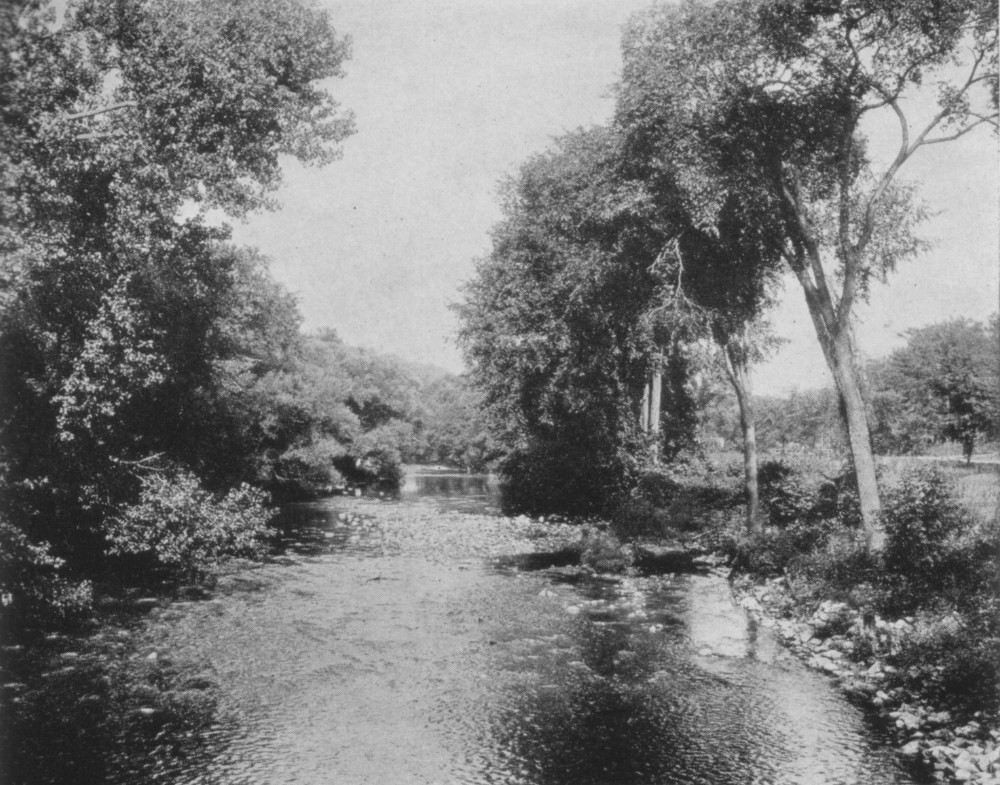 WILLIAMSTOWN WATERS  THE PIONEER HOMESTEAD - CONCORD  COMPARING RABBITS  PEPPERELL WATERS 20th. The drainage about the farm
buildings aside from the sewer should be natural. Lacking a proper porous soil
or a proper slope nothing can be done that is satisfactory. These imperative
features should be sought in the first place, and all will come right. 21st. In obtaining a country place
inevitable disappointment will follow if financial profit is the first
consideration, because no man will make enough to satisfy him, if that is his
aim. The first and last and constant feeling should be the joy in the
occupations connected with developing and carrying on the farm place. It must
be considered as an end worth while in itself, and not as a means to something.
If it is not good in itself it is not good at all. If one does not enjoy living
it and doing it, one will never get enough out of it. In other words one must
carry to the country the mind and heart that will find in the country something
to fill both.
THE first revenue derived from a
farm was the sum received for an old mowing machine sold for junk. It afterward
developed that the machine belonged to a neighbor who had stored it in our
barn. Revenue sometimes arises from the least expected quarters and is as often
lacking from those quarters which were supposed likely to produce it. Potatoes
are a mainstay to keep or to sell. Sweet corn is a delusion without a
prearranged market. Sometimes it can be sold to a cannery on a contract. Seed
raised for nurseries is sometimes a source of revenue, but it cannot do well
except in very clean fields, quite free from weeds. At least this applies to
grain. It is often possible by careful selection and sorting to secure moderate
quantities of seed that is salable in the spring. It is much better to raise
most of one's seed, because then one is sure of its freshness. Hay is a bad
revenue producer, because it saps the life of the farm to sell it. It should
all be fed out on the place. Grains, of course, can never be raised for sale,
to advantage, in New England. Eggs from early pullets are profitable, and so
are chickens raised very early. Garden products started in a hothouse may often
be disposed of to advantage, as such things are rare in the country and there
is a considerable number of summer residents who will take them. Main crops are not for the eastern farmer. He derives his revenue from a great many things; the garden, hennery, orchard, wood lot, a little here and a little there. The exceptions to this statement have mostly been noted above. 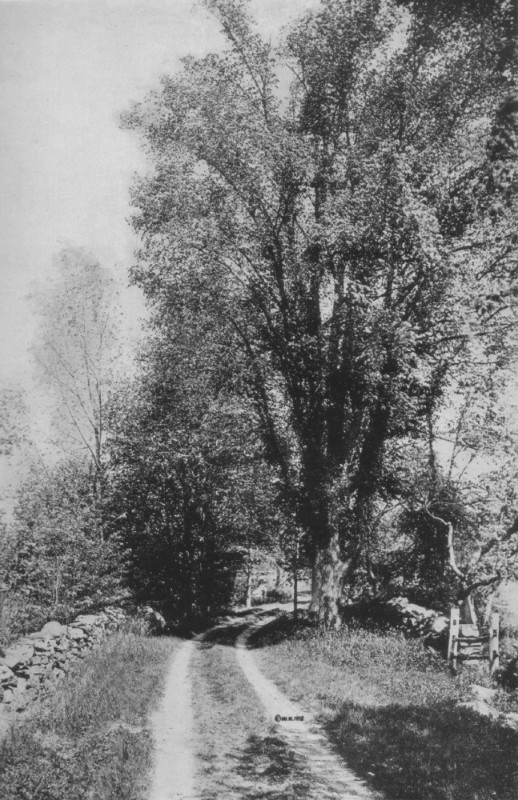 ELM BY THE RIBBON ROAD - ROYALSTON  A HATFIELD DOOR  A HINGHAM LANE PICTURE–MAKING EXPERIENCES
WHEN we visited the William Cullen
Bryant place, in Cummington, the day was bright and sweet with sunshine, and
the air crisp with the first touch of autumn. The homestead which he loved so
much is now vacant. The view from it is very extensive, sweeping for many
leagues over the Berkshire hills. The location must be lofty. Back of the
dwelling, really coming up to it, in an intimate way, was a splendid wood of
pines. Just beyond the farm buildings one entered under the dappled maple
shadows (p. 107). About the lawn were fine elms. We could easily understand
Bryant's love of trees, and how it continually crept into his poems. We sat
down, in a row, at the edge of the porch, and read two or three of his finest
appreciations of the natural world. The silence and absence of any living thing
about us added much to the effectiveness of the occasion. We knew that the
spirit which loved these surroundings was in harmony with our own. On "A Norfolk Farm Lane"
(p. 136) we found a most unusual place. It exemplified the attraction of an
independent enterprise, in the old days, which had everything under its own
roof. It appears that an early settler had understood vineyarding, and had
arranged his basement in a fashion found in some quarters of France. There was
a sub-cellar. A huge wine press, worked by a horse going around and around, was
installed there, and the great depth and massive stone work showed a feeling
for permanency. How little we know what is within doors as we pass by these old
dwellings. The rooms of the house were paneled in an interesting way and the
location was in every way attractive. In Ashfield there is an old
embankment, like a moraine, which impounds the lake shown on page 144. A path
is worn in the center of the embankment, and on each side are wonderfully
beautiful birches with their salmon-colored bark, and lusty large growth. It is
a spot much to be sought for on summer days, because a gentle breeze almost
always moves across here and the outlook feeds the imagination. We love the old roadside watering
places where drives were arranged so that one passed over little fords, by the
sides of the main road (p. 175), for watering the horses. In the early days a
long continued "dry spell" was bad for wheels as their spokes tended
to rattle. It was bad for the horses' feet, as they became too dry and hard.
Travelers were always glad to drive into a brook and wait for a few moments,
while the horses drank their fill and wheel and hoof were well soaked. There
was even an opportunity to eat luncheon, or, as they used to say, "take a snack."
"The Lynn Marshes" as seen on page 180, remind one of the days of the "Saugus Navy Yard." In the earlier days it was of the utmost importance to work sloops up stream as far as possible, because, in the absence of railroads, and even of roads worthy the name, there was a tendency to form a market at the height of tidewater. It is said that sloops were built at main points where now a row boat would hardly pass, owing to the silting up of old water ways. Laden sloops were taken up at high tide and allowed to strand at low tide. The effect on some of the north sea marshes must have been equal to the effect in Holland where one sees vessels apparently in the midst of the land. On the Saugus River it is said that there was a dam as early as 1629 and a fishway for alewives has been maintained there ever since. Possibly this is the oldest water power in America. A SOUTH SHORE DOOR The Aberjona River in Winchester (p. 72) is one of the streams approachable like English rivers. The bushy banks of most of our streams prevent our getting comfortably near them, and we are, therefore, the more delighted when we find grassy banks and an open growth of shade trees. The region all about Winchester is very attractive. A vision up the stream at Winchester which shows the stone church (p. 276), has all the charm of mellowness and age that we associate with English village scenes.  WINCHESTER WATERS  CONCORD BRIDGE 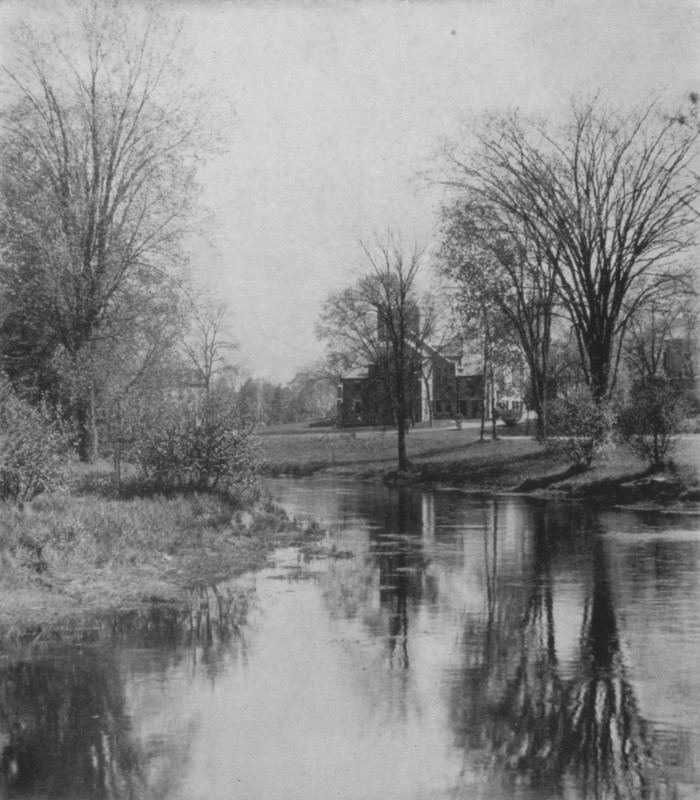 "OLD ENGLAND" - WINCHESTER  WATER LIGHTS - ADAMS There is a very ancient dwelling on
the old road from Lexington to Concord (p. 263), which probably shows a
condition common to many an early house. The somewhat flat roof, which almost
never appeared in the earliest period, generally indicates that the roof lines
were carried up by raising the side walls, and at the same time the effect was
to flatten the roof. Second story rooms were obtained in this manner, but picturesqueness
was lost. This house has wonderful old panels, and that very obvious appearance
of never having been dealt with, in its larger rooms, that always appeal to the
collector. The overarching elm is rendered more beautiful by a series of small
burls, like knobs, covering the main trunk, and many branches. These burls were
much used, when on maple and oak trees, for the forming of bowls. The grain of
the wood was very beautiful, but the object of the settlers in using it was to
obtain material that would not split. This tree is a fine sample of what is
often called the rooftree, by confounding this term with the ridgepole, which
is the true rooftree. On page 264 is a bit of the old
Connecticut trail running from Weston through Wayland. The residence is the
summer home of an artist who has allowed the house to blend itself with the
foliage in a subtle fashion. There is evidently a rabbit trade on
between the children sitting on hutches (p. 268). The little girl at the center
obviously has the prize animal, and she is the cynosure of neighboring eyes. It
would almost seem as if the rabbit was especially created for the delectation
of children. Its docility and adaptability make it a pet, better even than a
dog, in some particulars. Of course no dog lover would admit for a moment that
the finer intelligence and affection of his dog would place it in the same
class with any other pet whatsoever. |